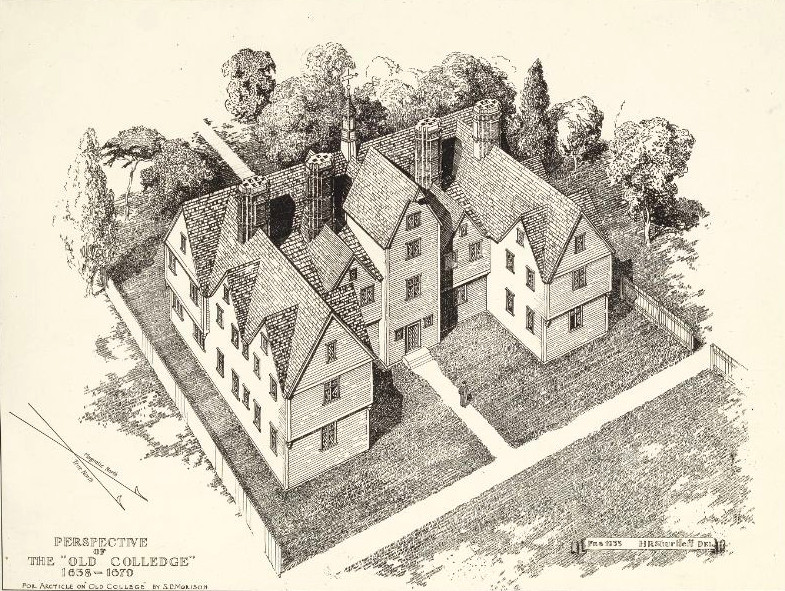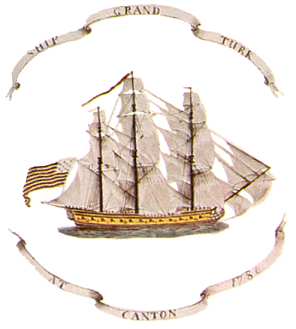|
Benjamin Pickman Jr.
Benjamin Pickman Jr. (September 30, 1763 – August 16, 1843) was a U.S. Representative from Massachusetts. Biography Pickman was born in Salem in the Province of Massachusetts Bay, a descendant of Benjamin Pickman, an Englishman from Bristol. Pickman graduated from Harvard University in 1784 after having attended Dummer Academy (now known as The Governor's Academy). The descendant of a Salem merchant family dynasty related to other prominent Salem families such as the Derbys, the Pickerings and the Crowninshields, Pickman studied law in Newburyport, Massachusetts, and was admitted to the bar, but soon relinquished the practice of law to engage in commercial pursuits, becoming one of the most active merchants of his day in Salem. Pickman's father Col. Benjamin Pickman, Sr., one of the most important merchants in Salem, had been a Loyalist, his estates confiscated by the Colonial government and was forced to flee America for England, only returning to Salem in 1785 after ... [...More Info...] [...Related Items...] OR: [Wikipedia] [Google] [Baidu] |
Newburyport, Massachusetts
Newburyport is a coastal city in Essex County, Massachusetts, United States, northeast of Boston. The population was 18,289 at the 2020 census. A historic seaport with vibrant tourism industry, Newburyport includes part of Plum Island. The mooring, winter storage, and maintenance of recreational boats, motor and sail, still contribute a large part of the city's income. A Coast Guard station oversees boating activity, especially in the sometimes dangerous tidal currents of the Merrimack River. At the edge of the Newbury Marshes, delineating Newburyport to the south, an industrial park provides a wide range of jobs. Newburyport is on a major north-south highway, Interstate 95. The outer circumferential highway of Boston, Interstate 495, passes nearby in Amesbury. The Newburyport Turnpike (U.S. Route 1) still traverses Newburyport on its way north. The Newburyport/Rockport MBTA commuter rail from Boston's North Station terminates in Newburyport. The earlier Boston and Maine Ra ... [...More Info...] [...Related Items...] OR: [Wikipedia] [Google] [Baidu] |
Harvard College
Harvard College is the undergraduate college of Harvard University, an Ivy League research university in Cambridge, Massachusetts. Founded in 1636, Harvard College is the original school of Harvard University, the oldest institution of higher learning in the United States and among the most prestigious in the world. Part of the Faculty of Arts and Sciences, Harvard College is Harvard University's traditional undergraduate program, offering AB and SB degrees. It is highly selective, with fewer than five percent of applicants being offered admission in recent years. Harvard College students participate in more than 450 extracurricular organizations and nearly all live on campus—first-year students in or near Harvard Yard, and upperclass students in community-oriented "houses". History The school came into existence in 1636 by vote of the Great and General Court of the Massachusetts Bay Colony—though without a single building, instructor, or student. In 1638, the colleg ... [...More Info...] [...Related Items...] OR: [Wikipedia] [Google] [Baidu] |
Crowninshield Family , a small island off the coast of Salem, Massachusetts
{{disambig ...
Crowninshield may refer to the following: * Crowninshield family, long-standing American family * USS Crowninshield, a World War I era American destroyer * Crowninshield Island Crowninshield Island, also known as Brown's Island, is a small island off the shore of Marblehead, Massachusetts. Since 1955, it has been maintained by The Trustees of Reservations. For all Trustees of Reservations purposes, the island is refer ... [...More Info...] [...Related Items...] OR: [Wikipedia] [Google] [Baidu] |
Elias Hasket Derby
Elias Hasket Derby (August 16, 1739 — September 8, 1799) was a Colonial American merchant based in Salem, Massachusetts who owned or held shares in numerous privateers. The crews of these ships took more than 150 prizes during the American Revolution, and the sale of the prizes resulted in great wealth to be shared. Derby was in business with his father, who died at the end of the war. After the war, Derby converted his large, swift ''Grand Turk'' to commercial use, and sent it as the first New England vessel to trade directly with China. By specializing in the East Indies trade, Derby became not only one of the wealthiest and most celebrated traders of the post-Revolutionary period in Salem, Massachusetts, but at one point reputedly the richest man in the United States. Biography Early life Born in Salem in 1739, Elias Hasket Derby was the son of Richard Derby (1712–1783), a sea captain and merchant, and his wife. This son never went to sea but entered his father's bu ... [...More Info...] [...Related Items...] OR: [Wikipedia] [Google] [Baidu] |
American Academy Of Arts And Sciences
The American Academy of Arts and Sciences (abbreviation: AAA&S) is one of the oldest learned societies in the United States. It was founded in 1780 during the American Revolution by John Adams, John Hancock, James Bowdoin, Andrew Oliver, and other Founding Fathers of the United States. It is headquartered in Cambridge, Massachusetts. Membership in the academy is achieved through a thorough petition, review, and election process. The academy's quarterly journal, ''Dædalus'', is published by MIT Press on behalf of the academy. The academy also conducts multidisciplinary public policy research. History The Academy was established by the Massachusetts legislature on May 4, 1780, charted in order "to cultivate every art and science which may tend to advance the interest, honor, dignity, and happiness of a free, independent, and virtuous people." The sixty-two incorporating fellows represented varying interests and high standing in the political, professional, and commercial secto ... [...More Info...] [...Related Items...] OR: [Wikipedia] [Google] [Baidu] |
Harvard Divinity School
Harvard Divinity School (HDS) is one of the constituent schools of Harvard University in Cambridge, Massachusetts. The school's mission is to educate its students either in the academic study of religion or for leadership roles in religion, government, and service. It also caters to students from other Harvard schools that are interested in the former field. HDS is among a small group of university-based, non-denominational divinity schools in the United States (others include University of Chicago Divinity School, Yale Divinity School, Vanderbilt University Divinity School, and Wake Forest University School of Divinity). History Harvard College was founded in 1636 as a Puritan/ Congregationalist institution and trained ministers for many years. The separate institution of the Divinity School dates from 1816, when it was established as the first non-denominational divinity school in the United States. (Princeton Theological Seminary had been founded as a Presbyterian institutio ... [...More Info...] [...Related Items...] OR: [Wikipedia] [Google] [Baidu] |
Massachusetts Constitution
The Constitution of the Commonwealth of Massachusetts is the fundamental governing document of the Commonwealth of Massachusetts, one of the 50 individual state governments that make up the United States of America. As a member of the Massachusetts Constitutional Convention of 1779, John Adams was the document's principal author. Voters approved the document on June 15, 1780. It became effective on October 25, 1780, and is among the oldest functioning written constitutions in continuous effect in the world. (The constitutions of San Marino and Vermont have sections still in force that are older.) It was also the first constitution anywhere to be created by a convention called for that purpose rather than by a legislative body. The Massachusetts Constitution was written last of the original states' first constitutions. Rather than taking the form of a list of provisions, it was organized into a structure of chapters, sections and articles. It served as a model for the Constitution ... [...More Info...] [...Related Items...] OR: [Wikipedia] [Google] [Baidu] |
11th United States Congress
The 11th United States Congress was a meeting of the legislative branch of the United States federal government, consisting of the United States Senate and the United States House of Representatives. It met in Washington, D.C. from March 4, 1809, to March 4, 1811, during the first two years of James Madison's presidency. The apportionment of seats in the House of Representatives was based on the Second Census of the United States in 1800. Both chambers had a Democratic-Republican majority. Major events * March 4, 1809: James Madison became President of the United States * October 27, 1810: Annexation of West Florida from Spain Major legislation * May 1, 1810: Macon's Bill Number 2, ch. 39, Constitutional amendments * May 1, 1810: Approved an amendment to the United States Constitution that would strip United States citizenship from any citizen who accepted a title of nobility from a foreign country, and submitted it to the state legislatures for ratification ** This am ... [...More Info...] [...Related Items...] OR: [Wikipedia] [Google] [Baidu] |
Massachusetts Governor's Council
The Massachusetts Governor's Council (also known as the Executive Council) is a governmental body that provides advice and consent in certain matterssuch as judicial nominations, pardons, and commutationsto the Governor of Massachusetts. Councillors are elected by the general public and their duties are set forth in the Massachusetts Constitution. The Governor's Council has gone through many different formations throughout its history, at times being simply a legal counsel, also serving as provincial magistrates and judges, sometimes acting as an executive in the absence of a Governor, to serving as an upper house of the Massachusetts General Court. Whether going by the name of "Council of Assistants" or Governor's Council, the power of the council has ebbed and flowed, however it has remained a mainstay in New England politics from the earliest colonial days of Massachusetts Bay. History The Massachusetts Bay Colony received its first royal charter in 1629, with the founding of ... [...More Info...] [...Related Items...] OR: [Wikipedia] [Google] [Baidu] |
American Revolutionary War
The American Revolutionary War (April 19, 1775 – September 3, 1783), also known as the Revolutionary War or American War of Independence, was a major war of the American Revolution. Widely considered as the war that secured the independence of the United States, fighting began on April 19, 1775, followed by the Lee Resolution on July 2, 1776, and the Declaration of Independence on July 4, 1776. The American Patriots were supported by the Kingdom of France and, to a lesser extent, the Dutch Republic and the Spanish Empire, in a conflict taking place in North America, the Caribbean, and the Atlantic Ocean. Established by royal charter in the 17th and 18th centuries, the American colonies were largely autonomous in domestic affairs and commercially prosperous, trading with Britain and its Caribbean colonies, as well as other European powers via their Caribbean entrepôts. After British victory over the French in the Seven Years' War in 1763, tensions between the motherland and he ... [...More Info...] [...Related Items...] OR: [Wikipedia] [Google] [Baidu] |
Loyalist (American Revolution)
Loyalists were colonists in the Thirteen Colonies who remained loyal to the British Crown during the American Revolutionary War, often referred to as Tories, Royalists or King's Men at the time. They were opposed by the Patriots, who supported the revolution, and called them "persons inimical to the liberties of America." Prominent Loyalists repeatedly assured the British government that many thousands of them would spring to arms and fight for the crown. The British government acted in expectation of that, especially in the southern campaigns in 1780–81. Britain was able to effectively protect the people only in areas where they had military control, and in return, the number of military Loyalists was significantly lower than what had been expected. Due to the conflicting political views, loyalists were often under suspicion of those in the British military, who did not know whom they could fully trust in such a conflicted situation; they were often looked down upon. Pat ... [...More Info...] [...Related Items...] OR: [Wikipedia] [Google] [Baidu] |





.jpg)

